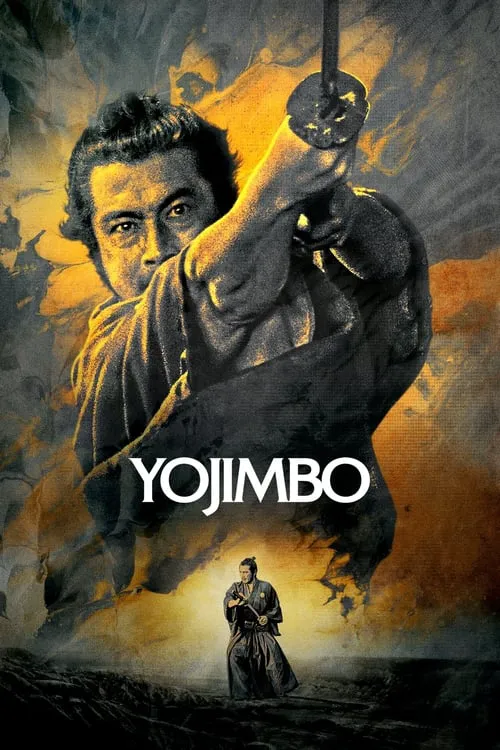Yojimbo

Plot
In the sweltering heat of feudal Japan, a nameless ronin drifts into a small village, unnoticed by its inhabitants. His presence is marked by the worn and weathered condition of his worn hakama, and the rusted edges of his katana. This is Sanjuro Kuwabatake, a masterless samurai with skills honed to perfection, and an unyielding desire to live life on his own terms. Unattached to any particular daimyo or lord, Sanjuro roams the countryside, seeking adventure and opportunities to utilize his deadly prowess. The village Sanjuro enters is a humble settlement, teeming with activity as preparations for the upcoming New Year's festivities begin in earnest. However, beneath the surface of this idyllic scene lies a web of intrigue and deceit, as two rival businessmen vie for control of the local gambling trade. Tazaemon, a silk merchant with a reputation for ruthless pragmatism, has set his sights on dominating the lucrative gaming industry. His primary opposition is Tokuemon, a sake merchant with connections to the local yakuza, or organized crime syndicates. Both Tazaemon and Tokuemon, sensing the ronin's potential as a valuable asset in their struggle for power, extend an offer to Sanjuro to serve as their personal bodyguard. Initially, Sanjuro is wary of committing himself to either faction, preferring instead to maintain a neutral stance. However, he eventually agrees to accept their proposition, ostensibly to enjoy the luxurious accommodations and sumptuous feasts offered by his would-be patrons. In reality, Sanjuro has a far more sinister intention. By playing both sides against each other, he aims to sow discord and set the two rival factions at each other's throats. Sanjuro knows that by allowing the local gang war to escalate, he can position himself at the center, ready to reap the benefits of their chaos. As the conflict between Tazaemon's silk merchants and Tokuemon's sake dealers grows more intense, the ronin skillfully exploits their weaknesses, manipulating both sides through clever deception and strategic maneuvering. To Tazaemon, Sanjuro presents himself as a paragon of loyalty and bravery, a skilled fighter who will stop at nothing to protect his patron's interests. In contrast, to Tokuemon, Sanjuro portrays himself as a seasoned veteran of the samurai code, bound by an unshakeable duty to serve his master above all else. Through careful manipulation, Sanjuro orchestrates a series of events that heighten tensions between the two factions. As a result, the village is torn asunder by violence and bloodshed, with neither side willing to yield to the other. Amidst this maelstrom of chaos, Sanjuro remains poised, always one step ahead of the warring factions. As Sanjuro's plan unfolds, his motives are called into question by those who are closest to him. Kyubei, a wise old tea master who harbors a deep respect for the ronin, begins to suspect Sanjuro's true intentions. Undeterred, Sanjuro presses on, driven by a singular desire to claim the spoils of war. The ultimate fate of the villagers hangs in the balance as Sanjuro orchestrates a series of devastating battles between the two opposing factions. With their lives hanging by a thread, the inhabitants of the village must rely on their own wits and cunning to survive the coming carnage. In the end, it is Sanjuro who emerges victorious, albeit at a terrible cost to the people he manipulated so skillfully. By the time the dust settles, Sanjuro has claimed a sizeable bounty for himself, cementing his reputation as the ronin with an unyielding will. Yojimbo, a classic tale of a lone samurai navigating the treacherous landscape of feudal Japan, paints a nuanced portrait of the era's intricate social hierarchies and the complex dynamics between master and servant. Through Sanjuro's machinations, Kurosawa Akira explores the darker aspects of human nature, unflinchingly examining the ways in which violence and exploitation can be used as instruments of social manipulation. In doing so, the film presents a scathing critique of the societal ills that plagued Japan during its feudal era, and leaves the viewer with a lasting sense of unease regarding the consequences of such reckless behavior.
Reviews
Recommendations




